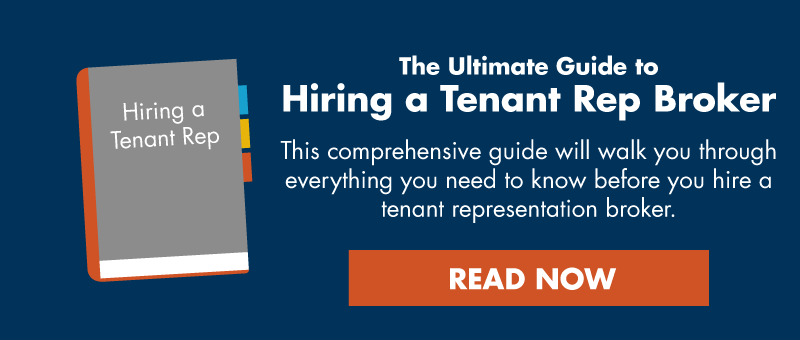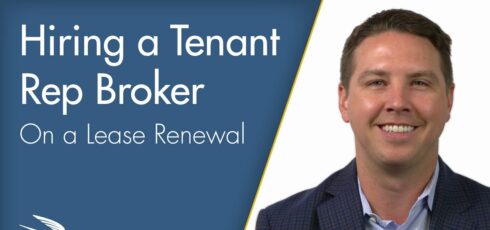If you’re a tenant in a building that just sold, you may be wondering how the change in ownership may impact you.
At AQUILA, we’ve represented numerous clients in this situation. In this article, we’ll explain exactly what you can expect if your property just sold or is about to change hands, including:
- What it means for your current lease
- How the type of buyer may affect your long and short-term tenancy within the building
- How it may impact your day-to-day experience within the building
Read Next: Lease Negotiations: What You Need to Look for Besides Rental Rate
How will new ownership affect your current lease?
The simple answer here is that a change in ownership will not directly affect your current lease terms. The new landlord is legally obligated to honor the terms of the lease you originally negotiated with the previous owner. Terms that remain unchanged include your existing rent schedule and any other rights you may have in your lease, including expansion or renewal options.
However, there may be policy changes within the building. And the new landlord may begin to enforce policies that are outlined in your lease that your previous landlord ignored or overlooked.
For example, the new landlord may crack down on companies that are overparking the garage. If your lease states that you have a 3:1000 parking ratio, but you’ve been getting away with parking at a 4:1000 rate, your landlord has the right to limit you to what is stated in your lease. They may issue a new parking pass, install badge access to the garage or even hire a garage attendant to ensure no tenants are using more than their fair share of parking.
Other policies may impact things outside your lease. Maybe the previous landlord was pet friendly, or, at the very least, had no pet policy in place. Your new landlord might institute a zero-pet policy in the building, especially if they plan to make capital improvements to the common areas.
How will the landlord’s long-term goals impact you?
Each owner has their own long-term goals, which may impact you in a different way.
A knowledgeable tenant rep broker can help you understand what your new landlord is looking to achieve by acquiring your building and help explain to you how this may affect your occupancy within the building.
The three main types of buyers currently in the market are the following:
- User Buyer: If the building was purchased by a user, it is possible that the company has plans to expand within the property over time (and potentially take the entire building at some point). For you, this may put long-term plans to renew or expand within the building at risk.
- Core Buyer: These buyers are typically institutional owners or commercial real estate investment funds who purchase stabilized assets and hold on to them for a number of years. While they may make minor capital improvements to increase the building’s attractiveness to tenants, their primary goal is to keep the building leased while they profit from the rental income. These types of buyers are likely to have the least impact on you.
- Value-Add Buyers: These buyers typically purchase older office properties with room for improvements and a relatively high vacancy rate. They will typically make a number of capital improvements to the property in order to increase asking rental rates and decrease vacancy. Value-Add Buyers typically hold the properties for less time than Core Buyers as their ultimate goal is to profit from the sale of the asset after improving the property and reducing the vacancy.
How will the trade impact your operating expenses?
Your operating expenses are comprised of three main components:
- Insurance
- Property Tax
- Common Area Maintenance (CAM)
While insurance rates will typically not change with ownership, property taxes, and common area maintenance fees could both potentially be impacted.
Property Tax
Typically, we find that in Austin, property values assessed by the county are lower than the actual value at which a property will sell for.
While Texas is a non-disclosure state, should the purchase price of the property become known to the public (and, more specifically, the tax assessor’s office), and assuming that the price is higher than the assessed value, the taxable value of the property will increase accordingly.
This increased property tax will be passed through to you, the tenant, as a part of your operating expenses.
To learn more about how appraisal values and property taxes affect your operating expenses, download our free whitepaper: What’s the Deal With All the Op/Ex?
Common Area Maintenance
Depending on the type of owner, the new landlord may want to make improvements to the property once they take ownership. This could be anything from lobby renovations or updating building systems (HVAC, mechanical or electrical systems), to repaving the parking lot or adding on-site amenities such as a gym or cafeteria.
This means you will want to make sure that no capital improvements are being passed back to you, outside of what is outlined in the CAM provisions in your lease.
Read more about what should and should not be included in your CAM expenses in our article: What are Common Area Maintenance (CAM) Fees?
Beyond Cost: How Changes in CAM May Impact Your Day-to-Day
If the landlord is making capital improvements, while you will ultimately get to enjoy a renovated lobby or new building gym, be prepared to deal with the headache of living through construction as these improvements come to life.
Additionally, new owners may employ new building management, janitorial services, or security personnel. As with any staffing or management change, this could have a positive or negative impact on your day-to-day experience within the building.
Next Steps
Now that you know how a change in ownership can impact your office lease and experience, if your property recently traded (or may soon change hands), it is important to fully assess how this new ownership will impact you.
We highly recommend engaging a tenant rep broker as soon as possible to analyze your current situation and provide insights into what may be on the horizon based on the ownership changes.
Find out everything you need to know about using a tenant rep in our Ultimate Guide to Hiring a Tenant Representation Broker.

Popular Articles:
- How Much Does it Cost to Lease Office Space in Austin, Texas?
- 3 Reasons to Use a Tenant Representation Broker for Your Lease Renewal
- What is a Tenant Rep Broker & What Do They Do?













